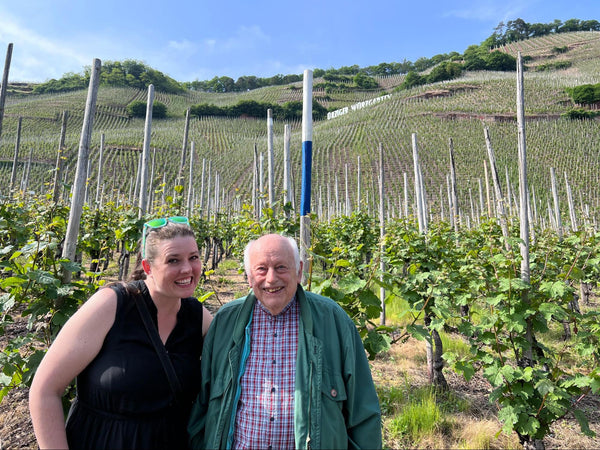Merkelbach

Merkelbach

People |
Brothers Alfred & Rolf Merkelbach, now in the hands of Sebasitan Selbach & his father Johannes

Focus |
1950’s style Rieslings from 1.5 hectares of very old vines.
Country |
Germany
Region |
Mosel
Sub Region/Village |
Ürzig
Climate |
Cool Continental
- Defined as very cold winters, hot, short, fairly rainy summers, with long, cool, dry autumns.
- Until climate change this was the very northern edge of where grapes could ripen fully, but only about 7 out of 10 years.
- Now: winters are usually not as cold, summers are much hotter, drought is a serious problem 4 or the last 5 years, and autumns start later and are often much wetter than they used to be.
- The unpredictability is what makes Mosel wines especially vintage sensitive and creates havoc (and high costs!) for winemakers.
- Cool climate wines are high in acid, low in alcohol, light in body, and often show a lot of mineral flavors rather than fruit.
- Usually white wines are made, but some light reds, like Pinot Noir can also ripen enough.
- Warmer vintages: 2020, 2019, 2018, 2015 produce wines with lower acidity, higher alcohols, and richer fruit flavors.
- Cooler vintages: 2021, 2013, 2010, 2008 produce what are now considered “classic” cool-climate wines
- 2022 is an enigma. It was hot and very dry for most of the growing season, but rain and long cold fall ended up giving us wines that taste more like “classic” cool-climate wines than rich, ripe wines.
Vineyards |
1.5 hectares of old, ungrafted vines

- Ürziger Würzgarten: an amphitheater shaped vineyard, super steep incline, with very stony, weathered red slate called Rotliegend. Wines here are spicy, exotic, with red and yellow fruit, saffron and wild mineral finish.


- Kinheimer Rosenberg - Just downstream the Ürziger Würzgarten with the same soils, almost as steep, with less of a bowl shape, and a slight western exposition. Very spicy and mineral.
Grape Varieties |
Riesling:
- The King of White Grapes.
- High acid, semi aromatic
- A huge variation in style potential from very light and dry, sparkling to the most unctuously sweet wines on the planet.
- Divisive for its high acidity and sugar retaining capabilities
- Perfect in its dynamic nature, ability to transmit the slightest nuance of terroir and being capable of aging for hundreds of years.

Farming |
Practicing organic
Cellar Work |
Traditional
- Large old Mosel Fuder (1000L) and Halbfuder (500L) barrels for fermentation and aging.
- For many years they used cultivated yeast, but since the Selbachs took over it is now spontaneous.
- Hand racked barrels
- Long lees aging
- Not much has changed in 50 years and the wines are still made in these cellars.

About the winery |
Drinking Merkelbach is like taking a sip of history. Rolf and Alfred had 140 combined vintages under their lederhosen and were ready to pass on the baton. They decided to sell to the perfect family, the equally historic Selbach are now in charge and taking great pains to keep the traditions alive.
The brothers only owned two three vineyards, with a few parcels leased in a third. Their home and backyard is the greatest of the three: Ürziger Würzgarten. It is one of the valley's steeper vineyards, curved into an amphitheater, and crimson-hued thanks to the red slate throughout.
These days, most Mosel wines are the result of technological advancements: made in stainless steel, with temperature control, selected yeast, and plenty of lab testing. But the charm of Merkelbachs' wines (and those of our other favorite Mosel winemakers) comes from the bare-bones, old-school methods used to make them. They aren’t formulaic or cookie-cutter — no, they're exotic and intense, ethereal and textured, delicate but with flair.
When the Selbachs took over, they agreed to keep making the wines the way they have been for decades. They also love drinking them, so why would they want anything to change? Everything is still done by hand, in their giant, ancient Fuder, with guidance from the Merkelbachs.
Four years on, how is Sebastian Selbach handling his new post? With much aplomb. At last year's Skurnik German tasting — among literally hundreds of wines — their 2021 Ürzinger Würtzgarten Kabinett bottle stood out among all the rest. Get a glass and jump into my time machine, these are a wild ride.
What do the wines taste like?
Classic, old-school, light as a feather, juicy and fruity but not too sweet, spicy as all get out with red bell pepper and citrus notes. They didn’t follow the fads of the last half century. Must weights have stayed at their lower end across the board. There are no GG’s. An occasional trocken will be found, if the vintage allows. True to the character of the Mosel and the Würtzgarten especially.

